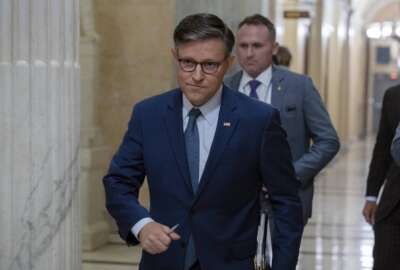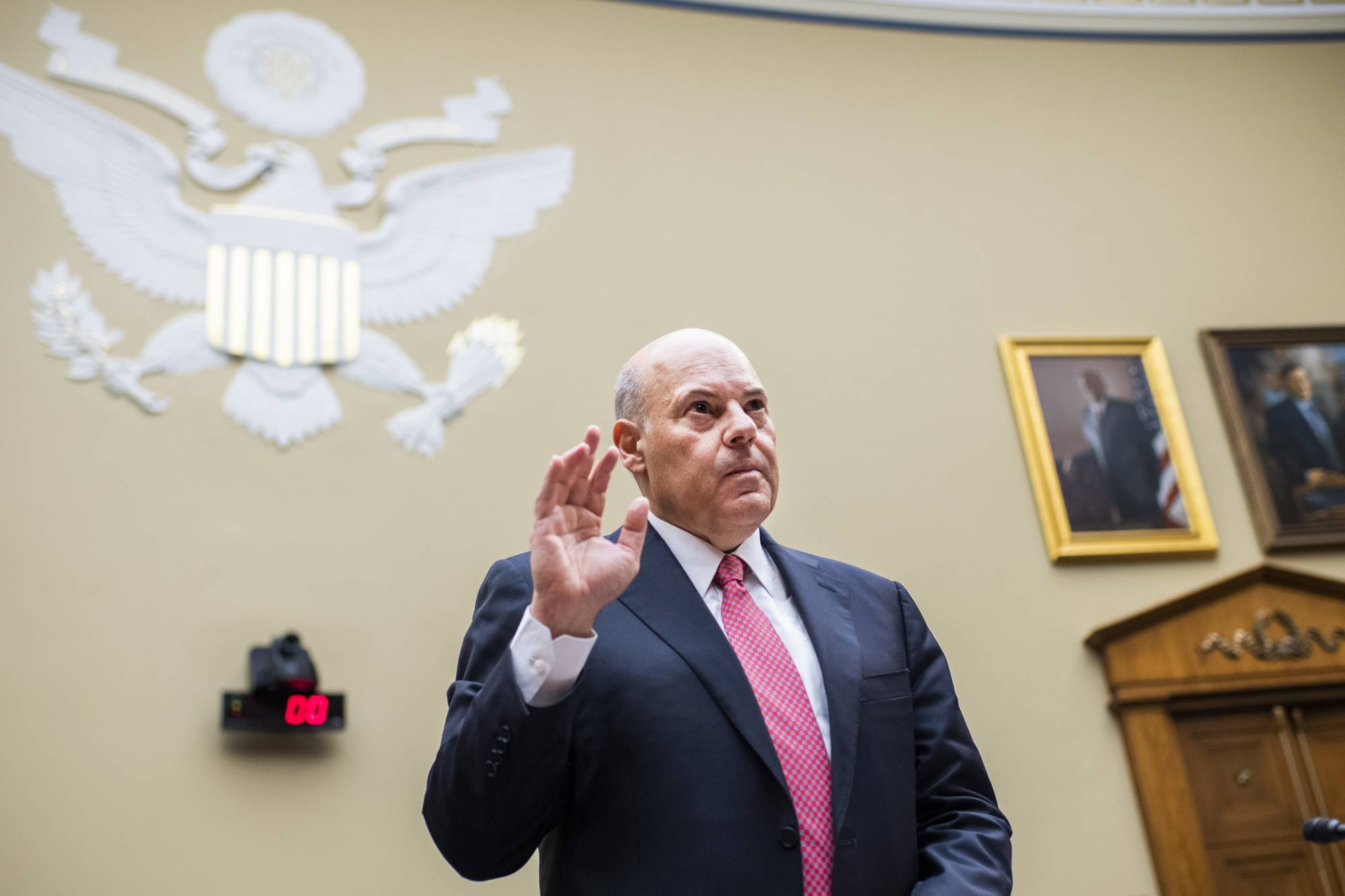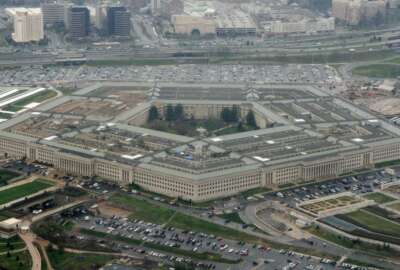This State Department executive has spent a career fighting for human rights
Scott Busby, a finalist in this year's Service to America Medals, and the deputy assistant secretary of state for the Bureau of Democracy, Human Rights and La...
Best listening experience is on Chrome, Firefox or Safari. Subscribe to Federal Drive’s daily audio interviews on Apple Podcasts or PodcastOne.
If the State Department stands for human rights and dignity around the world, then Scott Busby stands at the center of the State Department for his career seeking to defend human rights and protect refugees. Federal Drive with Tom Temin talks to Busby, a finalist in this year’s Service to America Medals, and the deputy assistant secretary of state for the Bureau of Democracy, Human Rights and Labor.
Interview transcript:
Tom Temin: And let me ask you first about the bureau. DRL: democracy, human rights and labor, in some sense, isn’t all of the State Department that? So tell us about what that bureau does in particular?
Scott Busby: Yes, our bureau’s job is to try to promote and ensure that there’s adequate attention to democracy, human rights and labor issues in our foreign policy. As you know, and people around the world know, there are lots of non-democratic governments out there in the world that we have to deal with. And there are lots of other equities that we often have in those relationships. So our job is to try to ensure that attention to the issues of democracy, human rights and labor are not lost in those conversations with other governments.
Tom Temin: And so how does that happen? What’s the process? There are ambassadors in all of those countries, and they talk with the leadership there, and we have an ambassador to the United Nations and so on? How do your thoughts get into those conversations?
Scott Busby: So we are engaging with our ambassadors around the world and with the embassies, and the people here in Washington who support those ambassadors. Part of our conversations are internal ones. But then we ourselves have direct engagement with governments of concern, as well as individuals, officials, both in those governments and international organizations advocating to them, that they pay attention to democracy, human rights and labor issues.
Tom Temin: And from the citation for your Sammys nomination. It looks like you personally have done more than simply advocate, but have also taken action to ensure that refugees are protected or that some change or protection is affected in other countries. Tell us more about that.
Scott Busby: Yes, well, there’s a variety of ways in which we try to elevate attention to human rights to get other governments to behave better when it comes to human rights. Some of those things are carrots, we offer other governments assistance programs, better trade arrangements, meetings with senior U.S. government officials, things of that nature to encourage better behavior. But we also have sticks. Those include economic sanctions, visa restrictions, withholding of assistance in cases where governments aren’t respecting human rights. So we try to balance out these carrots and sticks in our discussions with these governments to get them to do better on human rights.
Tom Temin: And when people think about human rights, and the lack of dignity and freedom, I think China probably comes to mind nowadays, certainly Russia, North Korea. You spent a lot of time focusing on South America, in your career, even outside of the State Department. And I remember in the 70s and 80s, the abusive governments of South America were the top of everyone’s mind. Tell us more about South America and where it stands today and your special interest there.
Scott Busby: Tom, you and I sound like we’re of the same generation as I was growing up and going to college and to graduate school. The civil wars in Central America were a predominant concern here in the United States, and were a special interest of mine. I had spent six months in Guatemala when I was an undergraduate. And that experience really moved me, compelled me to get more engaged, and so I worked with individuals from Central America fleeing the civil wars of the 1980’s, helping them to get asylum here in the United States. And that led to my interest in working on policies that could improve the human rights of individuals from those countries.
Tom Temin: And would you say there’s been some progress or maybe it’s a mixed bag, I guess, with respect to South America?
Scott Busby: Certainly in South America, in countries like Argentina, Chile, Peru, there’s been dramatic improvement in human rights. Indeed, we now have democratic governments in those places where we once had dictatorships, at least in Argentina and Chile. In Central America, it’s more of a mixed bag. We no longer have the civil wars of the 1980’s, where there were massive human rights violations. But we still have significant human rights violations in countries like Guatemala, Honduras, and El Salvador. And part of what our job within the State Department is to try to address those violations.
Tom Temin: We’re speaking with Scott Busby. He’s the deputy assistant secretary of state for the Bureau of Democracy, Human Rights and Labor, and a finalist in this year’s Service to America Medals program. And in some cases, there are tools that you can use for specific instances. Such as the murder of Jamal Khashoggi, the global Magnitsky Act, which didn’t exist when your career started, has that been helpful? And what are some of the tools that have been helpful in this pursuit?
Scott Busby: Yes, no question that the global Magnitsky Act has been a huge asset. It gives us the ability to economically sanction a human rights violator or abuser from any place in the world. That authority did not exist prior to global Magnitsky. So that’s a big new asset. But we also have new visa restrictions, some of which we’ve developed on our own, some of which have been provided to us by the Congress. And believe it or not, officials and their families from these countries, even if they are repressive countries, they want the ability to come to the United States, they want the ability to send their children to the United States to go to school. And so imposing visa restrictions on individuals engaged in human rights abuses, also is a major deterrent to bad behavior around the world when it comes to human rights.
Tom Temin: And in recent years, of course, the sensitivities to the LGBTQ folks has increased, certainly in the United States. But when you look around the world, what happens to those people elsewhere really makes the United States pale in comparison, and that’s become a hot button for you.
Scott Busby: Yes. That’s a major issue. I would say in the last decade or so this has become one of the cutting edge human rights issues around the world. And we now have a special envoy dedicated to working on those issues, Jessica Stern. But prior to her arrival, I effectively played that role in the last administration and tried to address those issues in a wide array of countries. Both then and prior to that.
Tom Temin: And you’ve seen a lot of secretaries of state come and go, you’ve seen a lot of political leadership come and go, a lot of administration’s come and go, as a career State Department person, have you felt like you were able to do your job, regardless of what the political overhead was at a given moment?
Scott Busby: Yes, I do feel like we’ve had that ability. First of all, these values are deeply entrenched in the American psyche, if you will. The American people, our own country was founded on the sorts of values. So they are values that are shared across political parties. And indeed, the Congress, in a bipartisan way, has been hugely supportive of our bureau and our work, as have the political leadership in both political parties. So DRL and myself, personally, we’ve been able to do a lot of our work, regardless of the party in power.
Tom Temin: And what made you choose a public service career early on? How’d you get into all of this?
Scott Busby: Well, as I say, I was working with Central American refugees, I wanted to help people basically, improve people’s lives, try to deter and bring to an end human rights abuses. And one thing led to another and I was in government and I came to realize that one can have a huge impact being inside government. As I was growing up in the ’70s and ’80s, I was quite critical of U.S. government and U.S. government policies. But then I came to see that there’s lots of ability to influence things from within U.S. government. And I guess that led to my, you know, developing a career inside the government, much to my own surprise, I should say.
Tom Temin: Scott Busby is the deputy assistant secretary of state for the Bureau of Democracy, Human Rights and Labor, and a finalist in this year’s Service to America Medals program.
Copyright © 2024 Federal News Network. All rights reserved. This website is not intended for users located within the European Economic Area.
Tom Temin is host of the Federal Drive and has been providing insight on federal technology and management issues for more than 30 years.
Follow @tteminWFED






